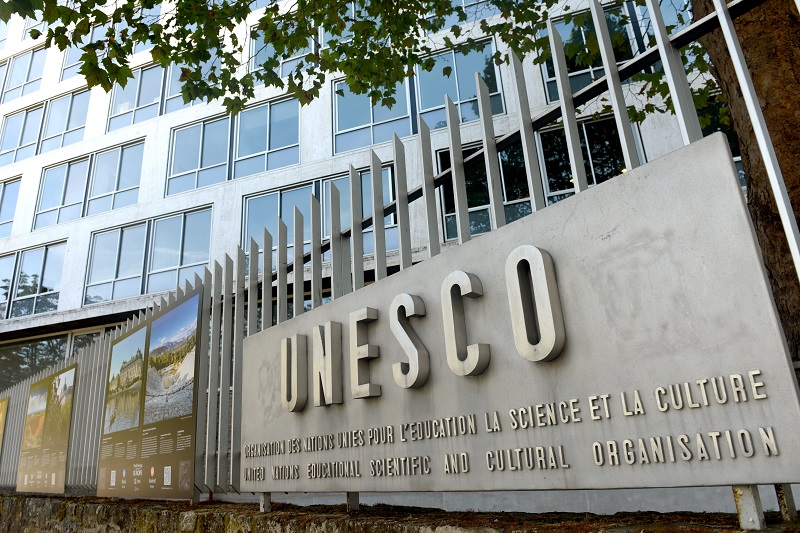Global Governance and Education: UNESCO’s Odyssey
This blog post by Alexandra Draxler and Maren Elfert, which is part of the NORRAG blog series on “International Organizations and the Global Governance of Education”, synthesizes some of the themes discussed in a recent podcast on UNESCO’s role in the global governance of education.
A recent podcast on a new book (2023) entitled Global Governance of Education: The Historical and Contemporary Entanglements of UNESCO, the OECD and the World Bank by Maren Elfert (of King’s College London) and Christian Ydesen (of Aalborg University in Denmark), instigated by the Association of Former Staff of UNESCO, provided a jumping-off point for an exchange about UNESCO’s destiny in the field of the global governance of education in a world that has greatly changed since it was founded.
The book itself represents a rich, analytical and historical overview of the entanglements (as the authors put it) of the three organizations since their founding: their mandates, their collaborations, and their inevitable jockeying for legitimacy and relative strengths. Based on extensive archival research and interviews, it goes beyond a recital of facts to an analysis of how education fits into the overall aims, objectives and value system of each.
While all three organizations were created after the war, they emerged from different agendas, which shaped their approach to education. UNESCO was created as the specialised agency of the United Nations with the mandate for education, while the World Bank and OECD started engaging with education in the early 1960s when education was promoted as a factor of economic growth. The World Bank emerged from the Bretton Woods conference– although it was associated with the UN, it always kept its independence from the UN system and was part of the world of finance and Wall Street. The OECD was originally created to administer the US-driven European Recovery Program (the Marshall Plan), and both the World Bank and the OECD had an economic mandate, while UNESCO was endowed with the mandate of peace-keeping and intellectual cooperation.
Against the background of these different mandates, UNESCO has always considered education as a purpose in itself and a common good, while the World Bank and the OECD have taken a human capital and “rates of return” approach to education, which is primarily of interest for its economic benefits. The three organizations also have different ways of governing and knowledge brokering. In terms of scale, the World Bank obviously dwarfs both UNESCO and OECD: more than three times the staff and roughly ten times their annual budgets.
The discussion turned around three main themes: purpose, relative weight of the expertise of each organization, and the strengths and weaknesses of UNESCO, partly relative to the other two organizations.
Concerning purpose, the authors felt that both the literature they studied and the interviews confirmed that UNESCO’s historic focus on education as a value in and of itself has at times put it in the crosswinds of the emerging focus on utilitarian, e.g. economic, values of education (“dominant managerial principles of effectiveness and accountability”) that are central to the World Bank and OECD’s embrace of education as an important tool for (economic) development. They stressed, in the podcast, that UNESCO is known for the expression it gives to its constitutional quest for peace and for encouraging the development of mindsets that will contribute to peace. They cited UNESCO’s commitment to lifelong learning, to fostering and maintaining the truly international dialogue between cultures in education. This includes pioneering work in terminology and measurement, various forums, and support for both empirical (statistical) and philosophical (international reports, dedicated institutes) work.
A part of the discussion was devoted to the World Bank/UNESCO Co-operation agreement (1964 to 1989), whereby the World Bank drew on UNESCO’s expertise to support its educational loans. When the World Bank decided to develop its own in-house expertise, beginning in the early 1980’s this shrank UNESCO own professional capacity and weight in sector analysis work. The Co-operative programme was considered by many in UNESCO as a “Trojan Horse” due to its connection to the World Bank and its independence from the Education Sector. The controversy around the programme reveals the divergent views on UNESCO’s mandate and role among UNESCO’s staff and member states, which goes back to the creation of the organization.
Finally, UNESCO is confronted with many obstacles at this time and in the future: changes in the status and commitment to global governance in general, the rising influence of for-profit and non-state stakeholders by their funding power, the challenges of “tied money” against the background of continuous budget constraints (“the achilles heel of UNESCO”), and geopolitical shifts. The organization will have to position itself vis-à-vis agendas such as the “neuro-affective turn”, a current movement in education that has vast funds behind it and is rooted in the life sciences. In that regard, Christian Ydesen asked the question, “Is it UNESCO’s best hope for the future to adopt the newest shiny object”?
The authors remain cautiously optimistic about UNESCO’s future. In some ways UNESCO may be better positioned to face the future as the OECD and the World Bank, because “UNESCO has different cards on its hand that it can play.”
The Authors:
Alexandra Draxler is Senior Advisor to NORRAG and Associate Editor of the International Journal of Educational Development. She was for many years at UNESCO, including serving as Secretary of the International Commission on Education for the Twenty-First Century that produced UNESCO’s Delors Report.
Maren Elfert is Senior Lecturer in International Education in the School of Education, Communication and Society at King’s College London. She is blog editor and Chair of the Editorial Board of NORRAG, submissions editor of the International Review of Education and member of the editorial board of Comparative Education.

